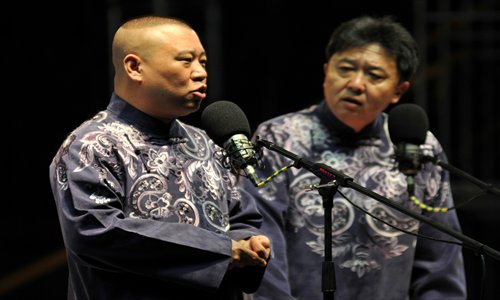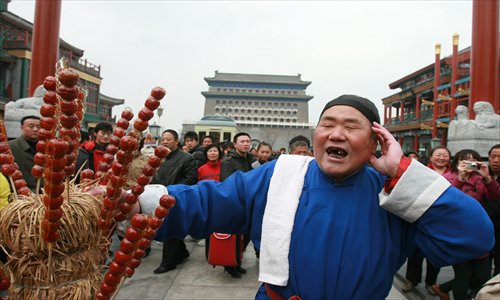Saving the Beijing dialect


A native of Dongbei (Northeast China), Fang Yanhong said that while she is concerned about the dialect of her hometown, "the Beijing dialect is dying faster." Fang, a modern Chinese lecturer at Beijing Union University, recently set up a research group to study the Beijing dialect.
Dong Shuren, a retired professor from Beijing Language and Culture University, agrees.
"The Beijing dialect is dying as fast as the hutong," Dong told the Beijing News, adding that the Beijing dialect plays an important role in history and cultural studies.
Preference for Putonghua
Based on her research, Fang said while it is inevitable that many languages will disappear one day, the decay of the Beijing dialect can be pinpointed to specific reasons.
The Beijing dialect is very similar to Putonghua, as the former was the basis of Putonghua. If a dialect is too similar to a standardized language like Putonghua, it's easier for it to disappear.
"Seven percent of people cannot tell if they are speaking Putonghua or the Beijing dialect," said Fang. "But I believe the percentage in real life is higher than the results from our research."
The Beijing dialect is unique for its pronunciation, intonation, and heavy use of rhotic vowels. A rhotic vowel is the distinctive 'er' added to the end of many words, which to some foreigners sounds like speaking with a mouthful of marbles.
When two words are repeated, such as "yeye" (grandfather) and "nainai" (grandmather), only the first syllable is stressed.
Onomatopoeia is also common in the Beijing dialect. For example, "Dingkuang" is to describe something that drops on the floor, and "Piacha" describes something that has fallen off.
Based on the questionnaire created by Fang's research group, factors that attribute to the preservation of the Beijing dialect include family, friends, media, education, popular culture and government policies.
"Highly-educated parents are more likely to speak Putonghua instead of the local dialect with their children," said Fang.
The research group also found that areas with a slower rate of development, such as the former Xuanwu district and Fengtai district, are better at maintaining the Beijing dialect, compared to rapidly developing districts. The deconstruction of traditional buildings in an older residential area also adversely affects the proliferation of a dialect.
Roots and evolution
"The Beijing dialect has 400 years of history, stemming from the Qing Dynasty (1644-1911)," said Yang Cheng, author of Huiwang Lao Beijing (Looking back to old Beijing).
In the Liao (916-1125), Jin (1115-1234) and Yuan Dynasty (1279-1368), Beijing residents spoke the dialect of the central plains.
But from that time on, when Beijing became the capital of the country, people from the nearby area settled down in Beijing, and the Beijing dialect started to carry an outside accent. As people from other parts of China settled in Beijing over time, the language evolved.
The Beijing dialect was also influenced by the language of the Manchu ethnic minority group, as the Manchu ruled the Qing Dynasty. Their language was created from characters based on the Mongolian language, part of the Manchu-Tungus language.
The Beijing dialect differs from east to west. For example, according to a book written during the Ming Dynasty (1368-1644), natives of east Beijing called a water bucket "shui tong" while residents of west Beijing called it "shui shao."
Modern influences
The Beijing dialect has contributed to a number of Chinese folk arts and entertainment, such as Peking Opera and pingshu (storytelling). It is also common among food and street vendors.
Crosstalk, or xiangsheng, a traditional comedic monologue, is one of the most significant folk arts based on the old Beijing dialect. However, many young performers today do not know the origins of this art form.
Following the government policy of promoting Putonghua, writers from Beijing, like Lao She, were encouraged to write in proper Putonghua. Local words used in his book Sishi Tongtang (Four Generations under One Roof) or The Yellow Storm, are not found in his later writings.
With the modernization of people's lifestyle, irrelevant terms have disappeared. For instance, "qianchou" used to describe cloth bags carrying coins. As most people use wallets now, the word has been antiquated.
Some words disappeared alongside the development of culture. "Rong xian pu" used to refer to a shop selling sewing items. Since such specialized stores no longer exist, the term also went.
"The future of Beijing dialect also relies on whether people like the language or not," said Fang.
From her research, only 34 percent of people said they prefer the Beijing dialect. Moreover, 49 percent of parents want their children to speak Putonghua, while only 37 percent would encourage their children to speak Beijing dialect.
Generally, women prefer to speak the standardized Putonghua, while men prefer using their dialect. For the majority of young immigrants who want to settle down in Beijing, Putonghua is their chosen language.
Beijing, the nation's flourishing capital, attracts people from all over the world. The language and dialect of the city, closely tied to social developments, will no doubt see changes with the passing of time. As the city is becoming more international, it's up to the residents to keep tradition alive.
Global Times